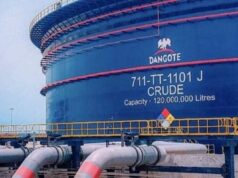Babatunde Fowler, executive chairman, Federal Inland Revenue Service (FIRS) on Tuesday, disclosed that Nigeria lost N1.127 trillion due to non-remittance of taxes by some companies involved in the refined products exchange agreement with the Nigerian National Petroleum Corporation (NNPC).
Fowler, who gave the hint at the opening of the investigative public hearing held at the instance of the Ad-hoc Committee on the management of crude oil swap agreements, chaired by Zakari Mohammed (APC-Kwara), threatened that the agency was contemplating on enforcing relevant laws to “stop NNPC from operating,” for failing to declare the incomes of its subsidiary, Duke Oil Limited.
Fowler also noted that FIRS had reported the two erring companies involved in the oil swap – Duke Oil and Transfugura – to Federal Ministry of Finance over tax evasion.
According to Fowler, NNPC subsidiary company involves in oil trading activities and as a vehicle for bringing NNPC directly in contact with the International oil market. The company which initially registered in Panama since 1989 but paid only N26,546,666.75 between August 2013 and August 2014.
Fowler, who puts the outstanding taxes at N1.1 billion, however noted that FIRS was unaware of the oil swap arrangement until the Committee initiated the investigative hearing.
He added that Transfugura which was engaged in the oil swap transaction over the years, did not register with FIRS and “has never filed any returns with FIRS” in breach of the our tax laws, particularly section 55(1) of the companies income tax Act, Cap C21, Laws of the Federation of Nigeria, which requires any company that carries on business in Nigeria to file returns on its income derived in Nigeria.”
In his presentation, Ogbonaya Orji, executive secretary of Nigeria Extractive Industry Transparency Initiative (NEITI), alleged that NNPC was indebted to the tune of $3 billion in 2012 as it could not meet up its financial obligations to its partners in the swap arrangement.
Orji, who called for discontinuation of the oil swap arrangement but urged NNPC to embark on direct importation of petroleum products, alleged that “the noble objective of this oil swap arrangement have been compromised and abused.”
He noted that while the cost of the crude oil swapped was $6.4 billion, the value of refined products returned to Nigeria for the swapped crude was $6.4 billion, leaving a deficit of $100 million as at 2012.
Also speaking, Alu Sule, Assistant Comptroller General (Tariffs & Trade) disclosed that no import or export duty is paid on Petroleum products by the NNPC and other companies involved.
When asked to produce relevant memo on the waiver/directive, the Customs official however declined knowledge of such.
While declaring the investigative hearing open, Speaker Yakubu Dogara who assured that the intent of the exercise was not to witch-hunt anyone, stressed the need to ensure transparency in the management of the nation’s oil sector.
He said “the issue of transparency in the management of the oil sector, considering its significance to the economy of Nigeria is at the very heart of our nation’s development challenge, especially at this time of dwindling revenue resulting from the continued drop in oil prices.
“You don’t have to be an economist to observe that if we do not improve on the management of available resources and effective utilisation of oil/petroleum resources to drive the economy, our developmental aspirations will continue to emaciate. It is in recognition of this pivotal role which the oil sector plays in aiding development that the present House of Representatives decided to place enormous emphasis on the improvement of the sector especially.”
On his part, Zakari Mohammed, Chairman of the ad-hoc committee, assured all the parties involved in the oil swap arrangement of fair hearing.
He however noted that the Committee would not hesitate to apply the hammer where necessary.









